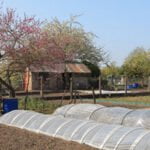The use of Preen in vegetable gardens has sparked a heated debate among gardeners and agricultural enthusiasts. Many people question the safety of using this popular weed control product in an environment where edible plants are being grown.
While some argue that Preen is harmless and effective, others express concerns about its potential risks and negative impacts on the health of both humans and the environment. This article aims to delve into this ongoing debate surrounding Preen’s safety in vegetable gardens, providing readers with an in-depth analysis of the various perspectives and considerations involved.
Preen is a widely-used herbicide that is designed to prevent weed growth in gardens and landscapes. It works by inhibiting seed germination, effectively halting the growth of unwanted plants.
This makes it an appealing option for veggie growers seeking to maintain weed-free environments without excessive manual labor. However, as with any chemical product used in close proximity to edible plants, there are valid concerns about its potential effects on human health and the overall safety of consuming vegetables treated with Preen.
In order to make an informed decision on whether or not to use Preen in your vegetable garden, it is crucial to understand both sides of the argument surrounding its safety. By examining the potential risks associated with its use as well as weighing the benefits it offers, you can gain a comprehensive understanding of whether or not this weed control method aligns with your gardening practices and values.
Let us explore these different perspectives further in order to provide you with the knowledge necessary for cultivating a safe and thriving vegetable garden.
Understanding Preen
Preen is a popular weed control product that is commonly used in gardens and landscapes. It is designed to prevent weeds from germinating, reducing the need for manual weeding or the use of other herbicides. Preen works by forming a barrier on the soil surface that inhibits weed seed growth and establishment.
The active ingredient in Preen is trifluralin, which belongs to a class of herbicides known as dinitroanalines. Trifluralin works by interfering with cell division in germinating weed seeds, preventing their roots from developing properly. This ultimately leads to the death of the young seedlings before they have a chance to grow and compete with desired plants.
Preen comes in different formulations, including granules and sprays, allowing gardeners to choose the most convenient option for their needs. The product should be applied to bare soil or mulch before planting or immediately after removing existing weeds. It is important to read and follow the manufacturer’s instructions carefully when using Preen to ensure proper application and efficacy.
While Preen has been widely used for many years, there are concerns about its potential environmental impact and safety in vegetable gardens. Critics argue that certain vegetables may be more sensitive to trifluralin than others, raising questions about its suitability for edible crops. In the next section, we will delve deeper into these concerns and explore the potential risks associated with using Preen in vegetable gardens.
| Category | Details |
|---|---|
| Product Formulations | Granules, Sprays |
| Main Active Ingredient | Trifluralin (dinitroaniline herbicide) |
| Mode of Action | Inhibits cell division in germinating weed seeds, preventing root development |
| Application Timing | Before planting or after removing existing weeds |
| Concerns | Potential environmental impact, safety for edible crops |
Potential Risks of Using Preen in Vegetable Gardens
Preen is a popular weed control product used by many gardeners, but there have been concerns about its safety when used in vegetable gardens. This section will delve into the potential risks associated with using Preen in vegetable gardens and examine the concerns raised by critics.
One of the main concerns about using Preen in vegetable gardens is its potential impact on human health. Some critics argue that the chemicals present in Preen may contaminate the vegetables grown in treated areas and pose a risk to consumers. They claim that these chemicals can be absorbed by plant roots and accumulate in fruits and vegetables, which can then be ingested by humans.
Another concern regarding Preen’s use in vegetable gardens is its potential harm to beneficial insects and pollinators. Preen contains chemical compounds that are designed to inhibit weed growth, but some worry that it may also harm non-targeted insects such as bees and butterflies. These insects play a crucial role in pollination, which is essential for the production of many vegetables.
Furthermore, there is concern about the long-term effects of using Preen in vegetable gardens. Critics argue that repeated application of this weed control product may lead to soil degradation and loss of biodiversity over time. They argue that relying on synthetic chemicals like Preen can disrupt natural ecosystem processes and make plants more susceptible to pests and diseases.
Weighing the Benefits
Preen is a widely used weed control product that has gained popularity among gardeners for its effectiveness in keeping gardens free of weeds. While there has been some debate surrounding the safety of using Preen in vegetable gardens, there are several benefits to consider when deciding whether or not to use this product.
One of the main advantages of using Preen in vegetable gardens is its ability to prevent weed growth. Preen works by creating a barrier on the soil surface that inhibits weed seeds from germinating. This means less time and effort spent on weeding, allowing gardeners to focus on other important tasks such as planting and harvesting their vegetables.
Another benefit of using Preen is that it can promote healthier plants in your vegetable garden. Weeds compete with vegetables for nutrients, water, and sunlight, which can stunt their growth and reduce overall yield. By preventing weeds from growing, Preen allows vegetables to get the necessary resources they need to thrive.
Furthermore, using Preen in your vegetable garden can help to reduce the need for chemical herbicides. Traditional herbicides often contain harmful chemicals that can negatively impact both human health and the environment. By using Preen instead, you can minimize your exposure to these chemicals while still effectively controlling weeds.
Key Factors to Consider
When considering the use of Preen in your vegetable garden, it is important to understand that not all plants will respond the same way to this herbicide. Different types of vegetables can vary in their sensitivity to Preen, making it necessary for gardeners to carefully assess which plants they are growing and how they may be affected by the product.
Susceptible Vegetables
Certain vegetables have been found to be more sensitive to Preen than others. For instance, leafy greens such as lettuce, spinach, and Swiss chard are known to be particularly susceptible to the herbicide.
This is because Preen works by inhibiting weed seed germination, but it can also inhibit the germination of certain vegetable seeds if not used properly. Other vegetables that have shown sensitivity include cole crops like broccoli, cauliflower, and cabbage, as well as root vegetables such as carrots and radishes.
Tolerant Vegetables
On the other hand, some vegetables are more tolerant to Preen and are less likely to experience negative effects from its application. Examples of these more tolerant vegetables include tomatoes and peppers. These types of plants have shown a greater resilience towards Preen and can often be safely grown alongside treated areas without issue.
Individual Plant Sensitivities
It is important for gardeners to note that while certain vegetables may generally be classified as either susceptible or tolerant to Preen, individual plant sensitivities can still vary within those categories. Factors such as soil nutrient levels, moisture content, temperature, and overall plant health can influence a vegetable’s reaction to the herbicide. Therefore, it is essential for gardeners to monitor their plants closely after using Preen and make adjustments accordingly.
In order to ensure the safety of your vegetable garden when using Preen, it is crucial to research and understand the sensitivity levels of the specific vegetables you are growing. By recognizing which plants are likely to be affected by Preen and which ones are more resilient, you can create a plan that minimizes any potential risks while still effectively controlling weeds in your garden.
Safe Application Practices
When using Preen in vegetable gardens, it is important to follow safe application practices to ensure the effectiveness of the product and protect the health of your plants. Here are some best techniques for using Preen in vegetable gardens:
- Read and Follow Label Instructions: Before applying Preen, carefully read and follow the instructions on the product label. The label provides important information, including dosage rates, application methods, and safety precautions. Following these instructions will help you achieve the best results while minimizing potential risks.
- Apply Preen at the Right Time: Timing is crucial when using Preen in vegetable gardens. It is recommended to apply Preen after planting seeds or transplanting seedlings, but before they have emerged or established their root systems. This allows the herbicide to prevent weed growth without harming your vegetables.
- Use Proper Dosage: It is important to use the correct dosage of Preen according to the size of your garden and the specific type of vegetables you are growing. Using too little may not provide effective weed control, while using too much can negatively impact your plants. Refer to the product label for guidance on dosage rates.
- Avoid Drift and Overspray: When applying Preen, take care to avoid drift and overspray onto desirable plants or areas where you don’t want weed control. Use barrier methods such as shields or wind guards to prevent herbicide from reaching unintended targets.
- Water-In After Application: To activate Preen and ensure its efficiency, water-in your vegetable garden after applying the product. This helps distribute it evenly throughout the soil and encourages it to form a protective barrier against weeds.
Implementing these safe application practices can help you use Preen effectively in your vegetable garden while reducing any potential risks associated with its use.
| Technique | Benefits |
|---|---|
| Read and Follow Label Instructions | Ensures proper usage and minimizes risks |
| Apply Preen at the Right Time | Prevents weed growth without harming vegetables |
| Use Proper Dosage | Provides effective weed control while minimizing harm to plants |
| Avoid Drift and Overspray | Prevents unintended damage to desirable plants or areas |
| Water-In After Application | Activates Preen for efficient effectiveness against weeds |
Alternative Weed Control Methods for Vegetable Gardens
Introduction
Preen is a commonly used weed control product that has sparked a debate regarding its safety when used in vegetable gardens. While some gardeners swear by its effectiveness in preventing weed growth, others raise concerns about the potential risks it may pose to the health of both plants and humans.
As a result, many individuals are seeking alternative eco-friendly options for controlling weeds in their vegetable gardens. This section will explore some of these alternatives and evaluate their effectiveness in maintaining a weed-free garden while ensuring the safety of vegetables and the environment.
The Importance of Eco-Friendly Weed Control
Maintaining an eco-friendly approach to weed control is crucial for not only protecting our health but also preserving the balance of our ecosystems. Chemical herbicides like Preen can potentially harm beneficial insects, soil microorganisms, and contaminate water sources if not used properly or in excessive amounts. By exploring alternative weed control methods for vegetable gardens, we can strike a balance between effective management of unwanted vegetation and environmental sustainability.
Possible Eco-Friendly Alternatives
There are several eco-friendly options available for controlling weeds in vegetable gardens without relying on chemicals. One popular method is mulching, which involves placing organic materials like straw, wood chips, or leaves around plants to suppress weed growth. Mulching not only helps conserve moisture but also deprives weeds of sunlight necessary for photosynthesis.
Another effective alternative is hand-weeding. Although labor-intensive, this method allows for selective removal of weeds without causing harm to vegetables. Regularly monitoring your garden and manually removing weeds as soon as they appear can help prevent them from spreading and competing with your crops.
Additionally, utilizing cover crops can help smother weeds and improve soil fertility. Certain crops like clover or buckwheat can be planted alongside vegetables to provide ground cover and outcompete weeds for resources.
By implementing these eco-friendly alternatives along with appropriate cultivation techniques, gardeners can effectively control weeds in their vegetable gardens while maintaining the health and safety of both plants and the environment.
Expert Opinions and Case Studies
When it comes to assessing the safety of using Preen in vegetable gardens, it is essential to consider expert opinions and case studies. These insights can provide valuable information and real-world experiences that can help gardeners make informed decisions.
Gardeners who have used Preen in their vegetable gardens offer a range of perspectives. Some praise its effectiveness in controlling weeds, noting that it significantly reduced the amount of manual weeding required. They also appreciate its long-lasting effects, which reduces the need for frequent reapplication. These gardeners argue that when used according to label instructions, Preen does not pose any significant risks to their vegetable plants.
However, other gardeners express concerns about the potential impact of Preen on their vegetable gardens. They worry about the possibility of residual chemicals affecting the quality and safety of their produce. Some report stunted growth or discoloration in their vegetables after using Preen. These gardeners emphasize the importance of thorough research and careful consideration before deciding to use Preen in edible gardens.
Agricultural professionals also contribute valuable insights based on their experience and knowledge of plant biology. Many highlight the importance of understanding specific plant sensitivities to herbicides like Preen. Different vegetable varieties may vary in their tolerance levels and reactions to these chemicals. Thus, it is crucial for gardeners to be aware of any known sensitivities or potential risks associated with particular vegetables before applying Preen.
Making an Informed Decision
When considering whether or not to use Preen in your vegetable garden, it is important to make an informed decision based on the safety of the product. Here are some tips to help you assess the safety of using Preen in your vegetable garden.
- Read and Understand the Label: Before using any product in your garden, it is crucial to thoroughly read and understand the label. The label will provide important information about the product’s ingredients, application rates, and any precautions or warnings. Pay close attention to any specific instructions for use on vegetables and make sure you are comfortable with the information provided.
- Research Potential Risks: Take the time to research any potential risks associated with using Preen in vegetable gardens. Look for scientific studies, expert opinions, and case studies that discuss the safety of Preen specifically in vegetable gardens. This will help you get a better understanding of any potential risks and allow you to weigh them against the benefits.
- Consider Your Specific Situation: Every vegetable garden is unique, so consider factors such as the types of vegetables you are growing, their sensitivity to herbicides, and your overall tolerance for risk. Some vegetables may be more sensitive to herbicides than others, so it is important to take this into account when assessing the safety of Preen.
Additionally, if you have a low tolerance for risk or prefer organic gardening practices, you may want to explore alternative weed control methods.
By following these tips and conducting thorough research, you can make an informed decision about whether or not Preen is safe for use in your vegetable garden. It is always best to err on the side of caution when it comes to applying chemicals near food crops, so take all necessary precautions before making your decision.
Conclusion
In conclusion, the safety and effectiveness of using Preen in vegetable gardens is a topic that requires careful consideration. While Preen can be an effective weed control method for maintaining a clean and healthy garden, there are potential risks that need to be taken into account. It is important for gardeners to weigh the benefits of using Preen against these risks before making a decision.
One of the key factors to consider when evaluating the safety of Preen in vegetable gardens is the sensitivity of different types of vegetables to the herbicide. Certain crops may be more susceptible to damage from Preen, so it is crucial to research which vegetables are at higher risk and adjust your application practices accordingly. By following safe application techniques and adhering to label instructions, you can minimize the potential harm to your vegetables while still benefiting from weed control.
It’s also worth exploring alternative eco-friendly options for weed control in vegetable gardens. There are a variety of organic methods available, such as mulching, manual weeding, and using natural weed killers, that can effectively manage weeds without introducing potentially harmful chemicals into your garden. These alternatives may require more effort and maintenance but provide peace of mind for those concerned about chemical exposure.
Frequently Asked Questions
What are the negative effects of Preen?
Preen, a popular weed control product, does have some potential negative effects. One of the main concerns is its impact on non-target plants. While Preen is effective in preventing weed growth, it can also inhibit the germination and growth of desirable plants if misused or not applied properly.
This can be particularly problematic for gardeners who may inadvertently harm their ornamental plants or other desired vegetation. Additionally, some studies suggest that certain active ingredients in Preen might pose risks to aquatic life if the product is washed into water bodies during rainfall or irrigation events.
Can I put Preen on my vegetable garden?
It is generally not recommended to use Preen directly on a vegetable garden without taking precautions or reading the label carefully. The reason behind this caution lies in the nature of the product itself. Preen primarily works by inhibiting weed seeds from germinating, which means it could potentially prevent vegetable seeds from sprouting and growing as well.
However, there are specific formulations of Preen made specifically for use in vegetable gardens that target weeds without harming vegetables. These products should be used according to their instructions to ensure safe application on edible crops.
When should you not use Preen?
There are several instances when using Preen should be avoided or postponed. Firstly, it is advised not to use Preen on areas where you plan to sow seeds for new plantings as it can inhibit their germination as mentioned earlier. Secondly, avoid using Preen around established plants that produce seeds you intend to collect and save for future planting, as it will inhibit their seed production process too.
Moreover, refrain from applying Preen near waterways or areas prone to runoff since it can have adverse effects on aquatic ecosystems due to its chemical composition. Lastly, pregnant women and individuals with respiratory issues should exercise caution while handling any chemicals including Preen and consider seeking alternative weed control methods when possible for their safety and wellbeing

If you’re looking to get into vegetable gardening, or are just looking for some tips on how to make your current garden better, then you’ve come to the right place! My name is Ethel and I have been gardening for years. In this blog, I’m going to share with you some of my best tips on how to create a successful vegetable garden.





